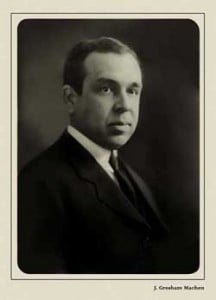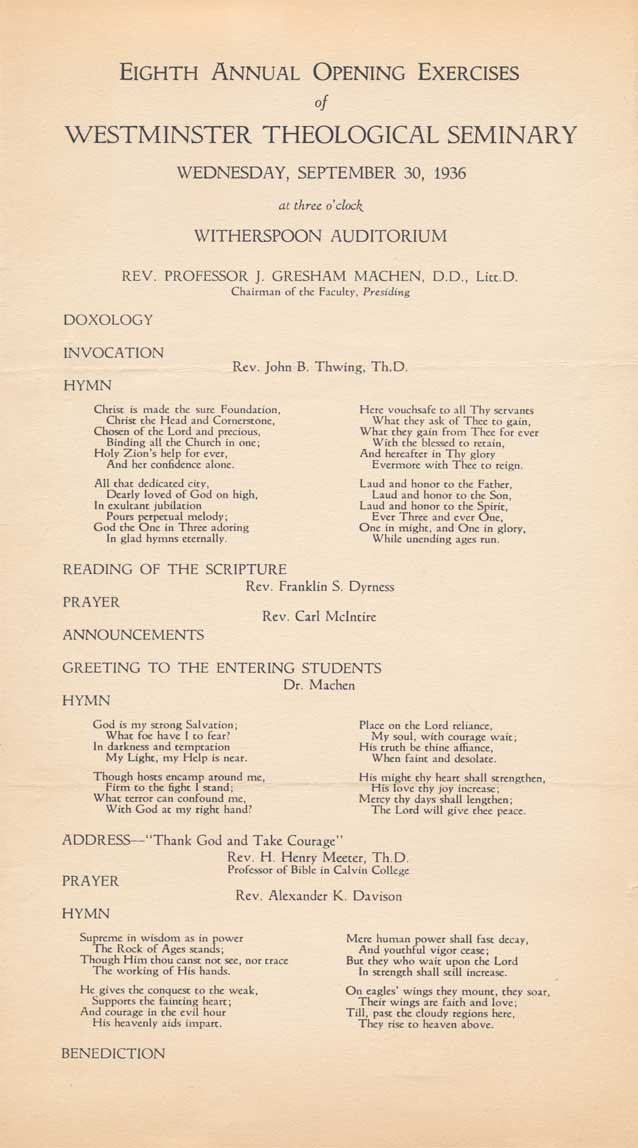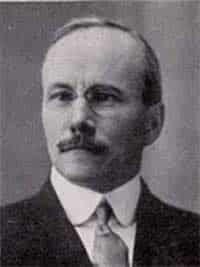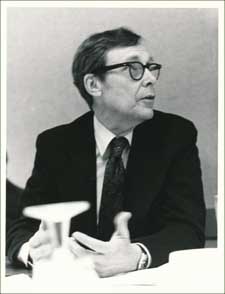Old Memories, Faded but True
 Today, we’ll take the liberty of cutting ourselves free from the moorings of the calendar, to look at some new material recently received here at the PCA Historical Center. The Rev. John MacRae, son of Dr. Allan A. MacRae, is soon to move into a new field of ministry in Australia. As he prepares for that move, he understandably has been clearing out some files and has recently donated some materials of his father’s. The PCA Historical Center already had received the Allan A. MacRae Manuscript Collection several years ago, but these several files look to be an important addition to that collection.
Today, we’ll take the liberty of cutting ourselves free from the moorings of the calendar, to look at some new material recently received here at the PCA Historical Center. The Rev. John MacRae, son of Dr. Allan A. MacRae, is soon to move into a new field of ministry in Australia. As he prepares for that move, he understandably has been clearing out some files and has recently donated some materials of his father’s. The PCA Historical Center already had received the Allan A. MacRae Manuscript Collection several years ago, but these several files look to be an important addition to that collection.
Among those documents, one caught my eye. The following is the larger part of that document, in which Dr. Allan A. MacRae recounts his memories of Dr. J. Gresham Machen. MacRae first knew Machen as a professor at Princeton Theological Seminary, and later as both men were part of the founding faculty at Westminster Theological Seminary. There is no claim that these recollections constitute great literature, but I think you should be able to read past that and enjoy the telling of the story:—
 I never had beginning Greek from Machen but I used to hear about his beginning Greek class, how he would make it easy for students by doing all kind of silly pranks, like standing with a book on his head, balanced on his head; standing on a chair and marking something on the blackboard….
I never had beginning Greek from Machen but I used to hear about his beginning Greek class, how he would make it easy for students by doing all kind of silly pranks, like standing with a book on his head, balanced on his head; standing on a chair and marking something on the blackboard….
During my second and third years I saw a good deal of Machen and got to know him rather well. I believe it was during my first year that I took his very famous course on the book of Galatians, in which he went through the book showing how strongly Paul felt about the importance of redemption through Christ being at the very center of Christianity, and how opposed [Paul was] to anything that would give to anything else a priority [over] our relation to the Lord. It was a very famous course and I enjoyed it very much. Unfortunately Machen’s time was largely taken up with beginning work as he had to give all the elementary courses in Greek and he did not give many advanced courses, so I did not have many courses from him. However, I got to know him very well.
I remember very vividly, after my second year, at the meeting of the General Assembly in Baltimore. There the action of the Board of Directors of Princeton electing him to be professor of apologetics was presented and turned down by the assembly. Union Seminary [New York] could appoint who they wanted, but Princeton Seminary was under control of the General Assembly, and no one could be appointed to a professorship in it without action of the General Assembly. When I came across Henry Sloane Coffin, who had recently become president of Union Seminary, I asked him, when will your election as president of Union be considered by the General Assembly? In answer, he declared, “Union Seminary is not subject to any ecclesiastical denomination.” Dr. Machen used to say, that Union had twenty years before thrown off all control of the General Assembly, and declared itself independent, but having done so, for Union Seminary men to work hard in the General Assembly to prevent his [Machen’s] election as professor of apologetics and to vote against it seemed to him to be utterly wrong.
When I came to Westminster to teach, naturally I had considerable contact with Dr. Machen. At that time Dr. Machen had an apartment high up in a building on 13th Street in Philadelphia, and there he used to hold his checker club, which was really an evening of being at home as he used to have at Princeton Seminary when he would have lots of candy and soft drinks around and boards for chess and checkers and other games. Once I played chess with him and he was thinking of something else, I guess, and I beat him. When I check-mated him, he was quite shocked and immediately said, “We must play again,” and now he beat me completely. I never claimed to be much of a chess player. A short term memory is very important for chess and mine has never been at all good. Machen was certainly far out of my class as a player. I remember Bob Marsden once telling me how he went to see Machen one afternoon in his apartment and Machen talked very cordially to him and seemed perfectly peaceful and at rest and relaxed in every way, and then he looked at his watch and said, “Oh my, I have to go now, I have to catch the train for Chicago.” Marsden was greatly impressed that a man would be so relaxed when he was actually ready to head for a long trip.
In the summer of 1936, I went to the Canadian Rockies and while there, Dr. Machen arrived. I was staying at a little inn a short distance from Lake Louise and he was staying at the Chateau. Dr. Machen was there for vacation, being very busy, but he spent most of his time there working and trying to write and answer for the Christian Reformed paper to a professor in the Seminary of the Dutch Reformed Church, who had criticized Machen’s statement that he was not for prohibition because he did not figure that such practices and habits were the proper area of government to enter into.
Later on Dr. Machen went to South Dakota at the request of one of the ministers of one of the little churches in South Dakota, to speak. It was winter and freezing cold. He had these tiny churches that were maybe fifty miles apart and this man took him in his car and Machen got a bad cold which went into his chest and somebody said you should stop and recover from this. He said, “No, I must meet my appointments.” So he kept going. The result was he got pneumonia and died from it. It seemed to me that his death at that time was really the result of a false conscientiousness that refused to take care of himself when he had made an appointment that would have to be broken otherwise. Actually it meant that many occasions later when he could have given great Christian messages that would have been greatly blessed of the Lord, were lost because of his giving his life at that time for what seems to me to be an insufficient cause.
We used to remember that sermon that Machen gave frequently on the hymn, “There is a Green Hill Far Away.” It was a wonderful presentation of the atonement of Christ and we loved it.
Machen had been a member of the Benham Club. In this Club at the Seminary, which claimed to be the finest social club in the Seminary (they had four eating clubs by the way), in that club everybody had to do stunts. Machen had stunts he made, and whenever there was any gathering where Machen was present, he was always asked for a stunt. He would make those funny faces and say things so interestingly. His great thing they used to ask for was how Bill Adams won the battle of Waterloo. Then he had another one on eloqution in which he made fun of the pronunciation of certain sounds. There was one he gave once which impressed me greatly about the tiger that ate up every member of the family one by one and the father could not bear to kill the tiger because when he saw its fine mild eyes he was just unable to hurt it. I used to love him give this. He gave it only rarely, but after Westminster was founded, when he would give a stunt and the opportunity came to ask for one, I asked for this. Though I had heard it comparatively seldom, while I was in Seminary, we began to hear it rather frequently. Then one time Dr. Dodd was present and Dr. Dodd spoke about the tiger which was the Presbyterian Board of Foreign Mission. It was very effective the way Dr. Dodd used it. I have not known anybody since who could give stunts the way Dr. Machen could.
Dr. Machen gave talks on radio and used to work all week over these talks. Then he said to me once, “I have been working over these for colloquial language and it is a tremendous job to work over them for a book.” Of course, they published the series in a book, called The Christian Faith and the Modern World. He said, “I have decided to write them as if they were for a book.” Actually they were every bit as effective then as before. They were wonderful talks and his series on that subject was very excellent.
Dr. Machen was a very fine Christian, a lover of the Lord and a lover of the great doctrines of salvation. He had been conditioned by his training and he did not have the realization of the centrality of the Word of God that I wished he might have, though he thoroughly believed in its inerrancy. I remember one time he told me of a minster who had left the denomination he belonged to, and had because he was irritated at their creedal statements and wanted to build his ideas already from the Bible. He was rather amused at this, but he said, “It really is strange what fine theology this man had derived simply from the Bible.”
I remember once hearing of Dr. Machen’s telling of his crossing of the ocean in which Shailer Matthews of the University of Chicago Divinity School was also there. He had many talks with him and said, “We came to the conclusion in the end that there was one point on which we agreed, that both of us liked Boston Baked Beans.” Actually this illustrates Machen’s clear vision of the errors of modernism.
My introduction to Machen came when I came across his book Christianity and Liberalism. I started to read it and could not let it down till I finished it. It was surely a clear presentation of the fact that liberalism belongs not to another religion than Christianity, but to an entirely different type of religion. Machen was a very fine Christian, a fine gentleman, a lover of the Lord, a man with fine personal qualities, but a man who was ridiculed and criticized by those who hated what he stood for and some of their criticisms and attitudes were passed, taken up unthinkingly by other people. It was a great privilege to have had the association that I had with Dr. Machen.
Words to Live By:
J. Gresham Machen is yet another of those who finished the race well. As such, he is a part of that cloud of witnesses, examples to us of those who held fast to the promise of the Gospel. They persevered in looking unto Jesus, the author and finisher of our faith. May we follow in their example. May our eyes be kept fast upon Jesus Christ our Lord.
Wherefore seeing we also are compassed about with so great a cloud of witnesses, let us lay aside every weight, and the sin which doth so easily beset us, and let us run with patience the race that is set before us, looking unto Jesus the author and finisher of our faith; who for the joy that was set before him endured the cross, despising the shame, and is set down at the right hand of the throne of God.” – (Hebrews 12:1-2, KJV).





